Introduction
Nigerian wedding customs are celebrated for their vibrant colors, deep symbolism, and joyful communal spirit. Across Nigeria’s diverse cultures, these traditions represent not only the union of two people but also the coming together of families and communities. This article explores the meaning behind Nigerian wedding customs, their evolution, and their impact on modern society, using real-life case studies and easy-to-understand explanations.
Nigerian wedding customs are a blend of ancient traditions, family values, and modern influences. These customs differ across Nigeria’s many ethnic groups, but all share a focus on respect, unity, and celebration. Whether in a bustling city or a rural village, a Nigerian traditional wedding is a grand affair full of meaning and joy.
The Importance of Nigerian Wedding Customs
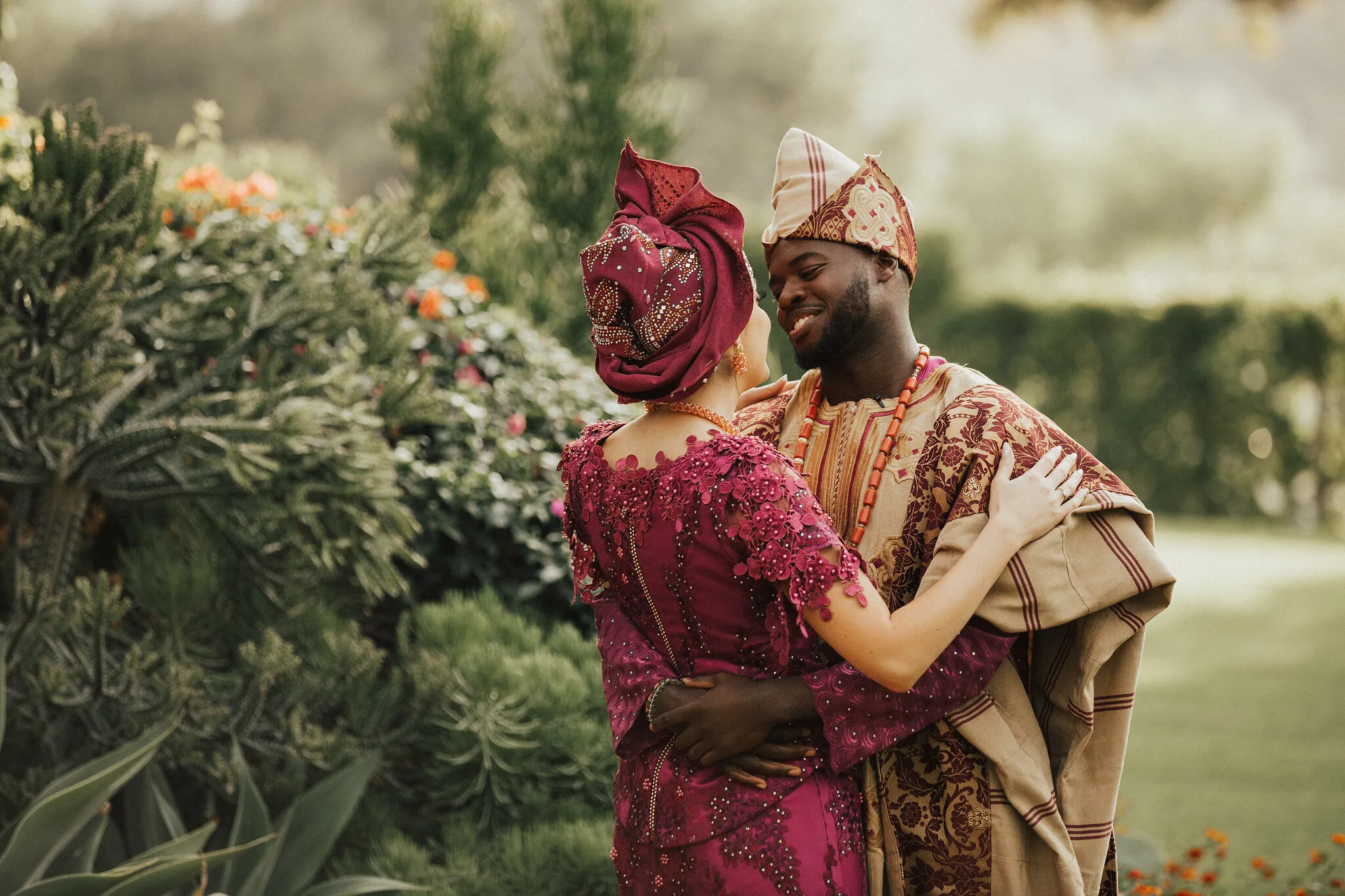
Marriage in Nigeria is more than a personal commitment—it is a community event that strengthens family bonds and preserves cultural heritage. Traditional weddings are seen as the true union, with church or court weddings considered optional in many communities. The customs performed during these ceremonies are not just rituals; they are powerful symbols of acceptance, respect, and love.
Key Pre-Wedding Rituals
Before the main wedding day, several important steps take place:
- Introduction Ceremony: Both families meet formally for the first time to discuss the union and exchange symbolic gifts such as kola nuts, wine, and fruits.
- Payment of Bride Price or Dowry: The groom’s family presents gifts or money to the bride’s family, symbolizing appreciation and respect.
- Gift Exchange: Items like clothing, food, and drinks are given to strengthen the bond between families.
Main Wedding Ceremony Traditions
Each Nigerian ethnic group has unique wedding customs, but some elements are widely shared.
Yoruba Wedding Customs
Nigerian Wedding Customs in Yoruba Culture
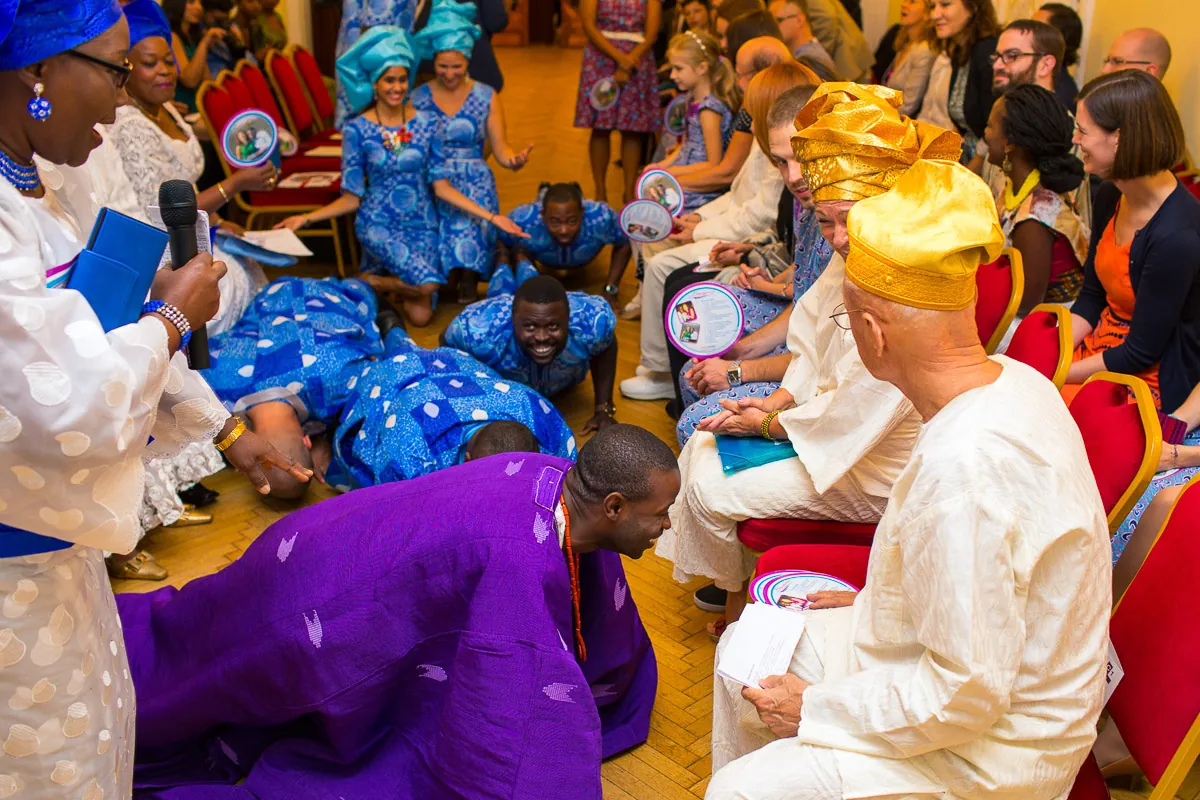
- Prostration: The groom and his groomsmen prostrate before the bride’s family to show respect and ask for her hand in marriage.
- Aso-Ebi: Family and friends wear matching fabrics to show unity and support for the couple.
- Gift Presentation (Eru Iyawo): The groom’s family presents gifts to the bride’s family, including food, clothes, and symbolic items.
- Selection of Symbolic Item: The bride chooses a significant item (often a Bible or Quran) from the gifts, symbolizing her faith and the foundation of the marriage.
- Dancing and Celebration: The event ends with lively music, dancing, and communal feasting.
Igbo Wedding Customs
Nigerian Wedding Customs in Igbo Culture
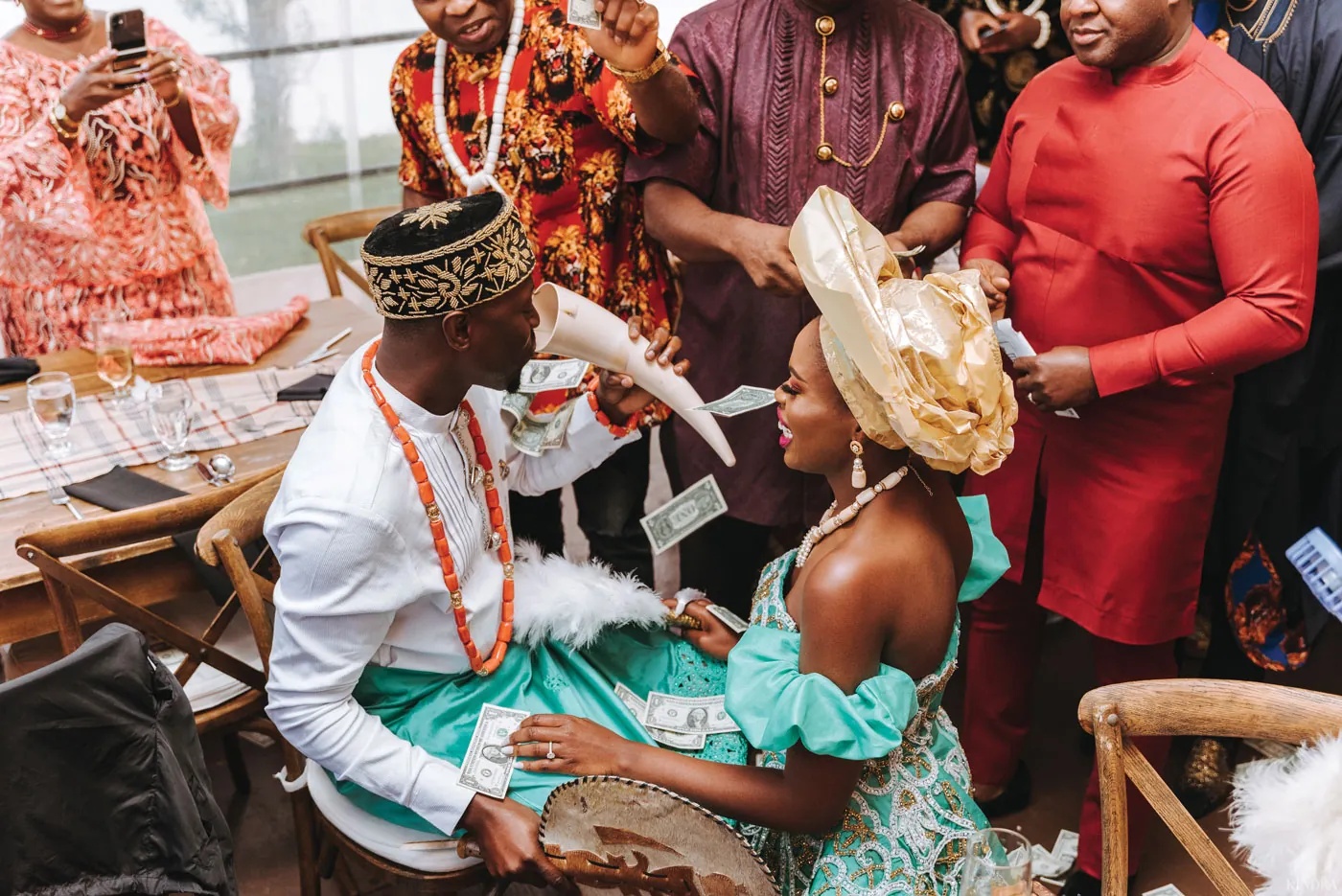
- Wine-Carrying Ceremony: The bride must find her groom among the guests and present him with a cup of wine, symbolizing her choice and acceptance.
- Breaking of Kola Nut: The kola nut is shared among the families as a symbol of hospitality, unity, and respect.
- Traditional Attire: The groom wears a red cap and Isiagu fabric, while the bride dons colorful wrappers and beads.
- Family Blessing: The bride’s father formally hands her over to the groom’s family, signifying the transfer of responsibility and care.
Hausa Wedding Customs
Nigerian Wedding Customs in Hausa Culture
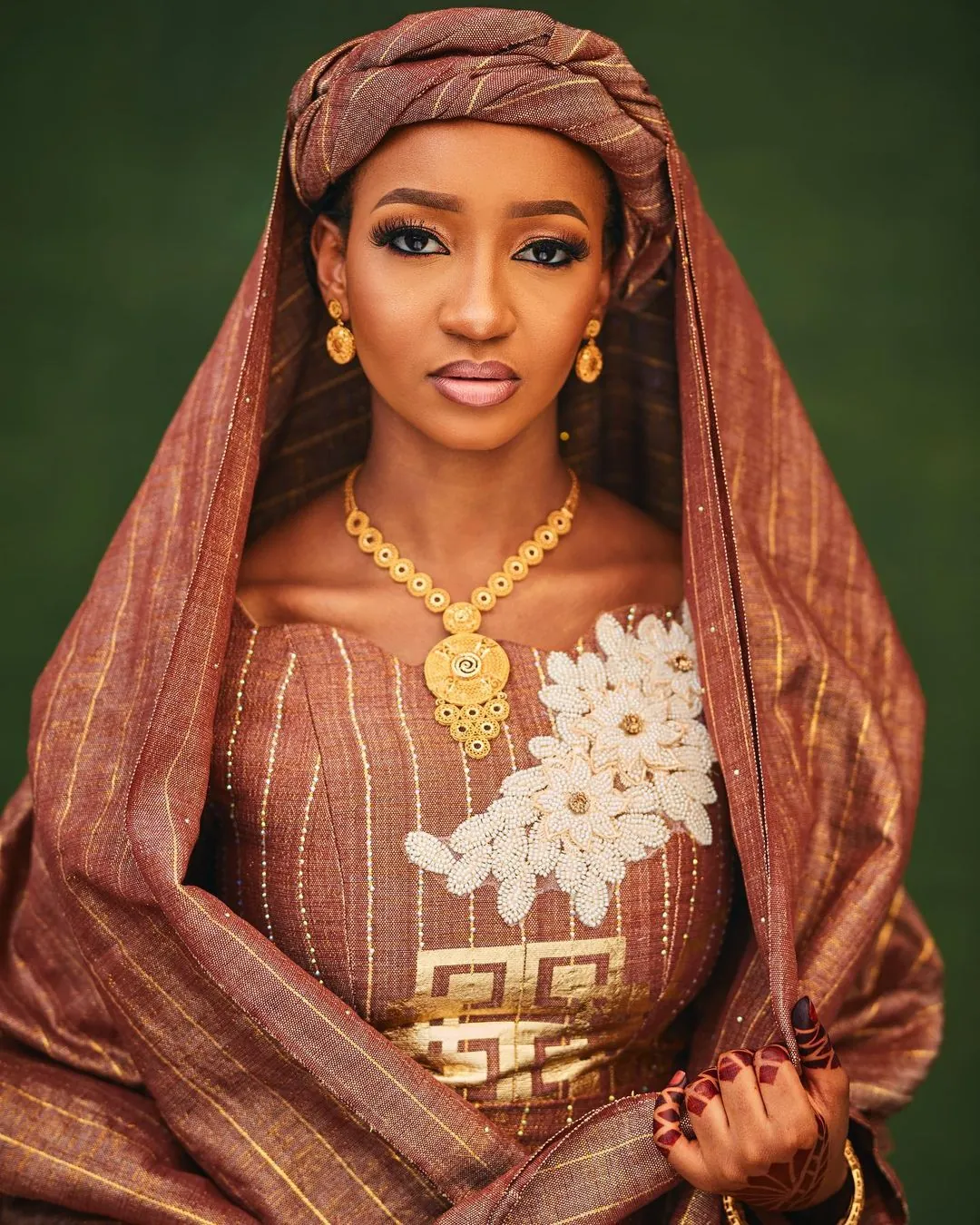
- Kayan Zance: The groom’s family presents gifts to the bride’s family, including clothing, perfumes, and money.
- Fatiha Ceremony: The wedding contract is signed in the presence of religious leaders and family members.
- Traditional Attire: The groom wears a woven Hausa cap (fula) and flowing robes, while the bride wears richly embroidered dresses.
- Community Celebration: The event is marked by prayers, music, and communal feasting.
Symbolic Wedding Attire and Aso-Ebi
Attire is a major highlight of Nigerian wedding customs. The bride, groom, and their families wear colorful, traditional outfits that reflect their heritage and status.
| Group | Bride’s Attire | Groom’s Attire | Headpiece | Family Dress (Aso-Ebi) |
|---|---|---|---|---|
| Yoruba | Iro and Buba, Gele | Agbada, Fila | Gele | Yes |
| Igbo | Wrapper, Blouse, Coral Beads | Isiagu, Red Cap | Head tie | Yes |
| Hausa | Embroidered Dress, Veil | Babban Riga, Fula Cap | Hijab/Veil | Sometimes |
- Aso-Ebi: Matching fabrics worn by family and friends signify unity and support for the couple.
- Gele: A stylish head wrap worn by brides and female guests, often matching the wedding colors.
Joyful Music, Dance, and Festivities
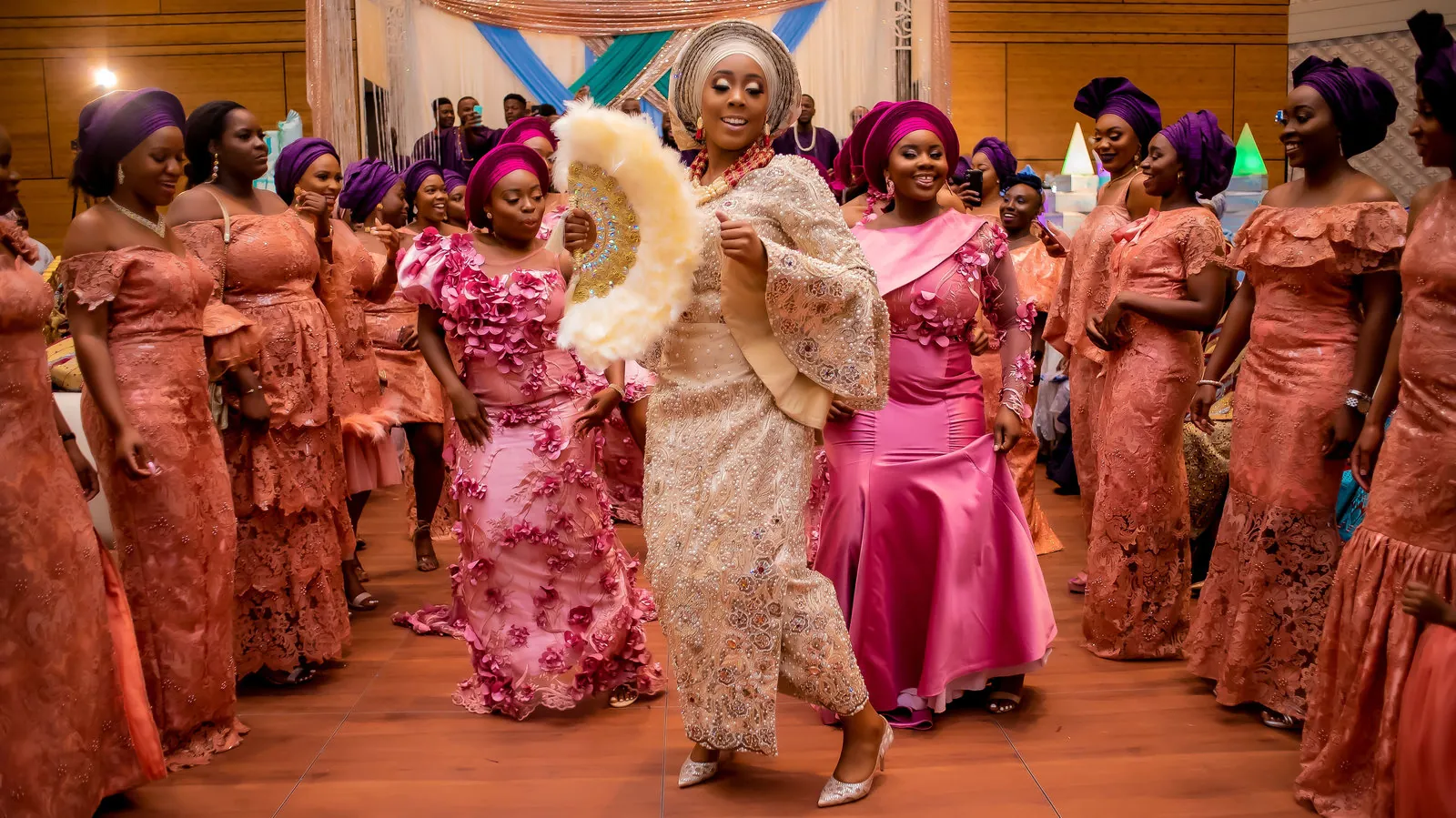
Music and dance are essential to Nigerian wedding customs. Traditional drummers, singers, and dancers create a lively atmosphere, and guests join in to celebrate the couple’s union.
- Live Bands and DJs: Provide a mix of traditional and modern music.
- Cultural Performances: Dancers and masquerades entertain guests, especially at Igbo and Yoruba weddings.
- Spraying Money: Guests often shower the couple with money while they dance, as a sign of goodwill and blessing.
Traditional Wedding Food and Drinks
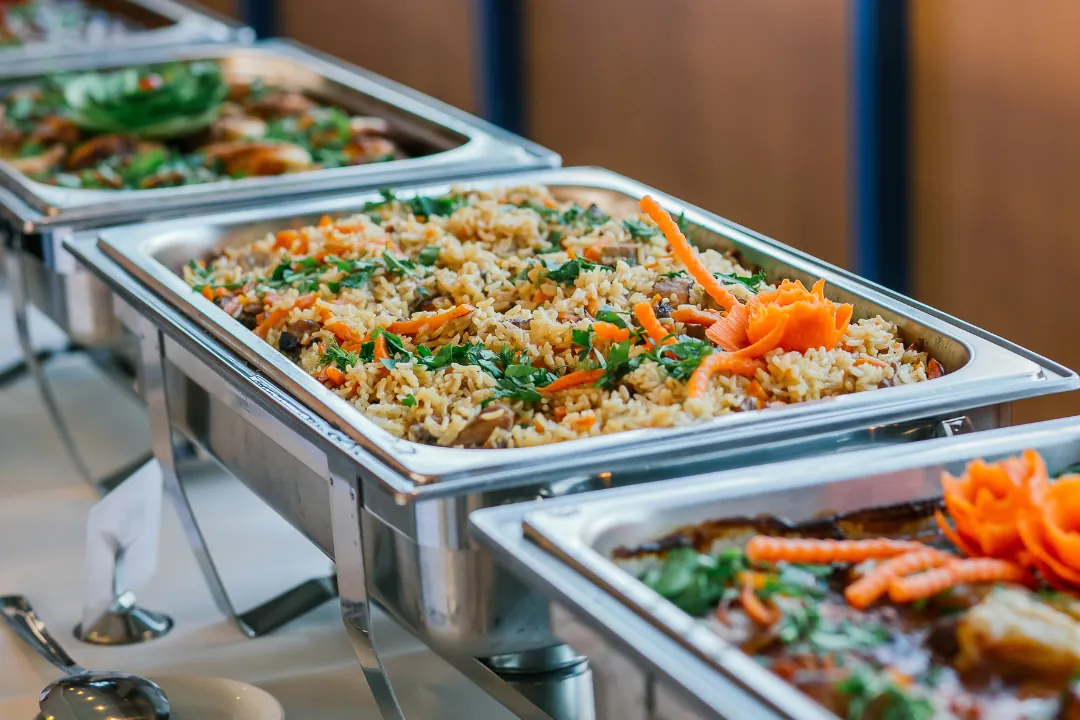
Nigerian weddings are famous for their abundant and delicious food.
- Jollof Rice, Amala, Fufu, and Soups: Staples at most weddings.
- Meat Skewers and Stews: Popular for their rich flavors.
- Amala “On the Spot”: A Yoruba tradition where amala is freshly prepared at the venue.
- Palm Wine and Local Drinks: Served at many weddings, except where religious customs prohibit alcohol.
- Bride’s Family Cooks: In many communities, the bride’s family provides the food, emphasizing hospitality and unity.
The Influence of Nollywood and Modern Trends
Nollywood, Nigeria’s film industry, has had a huge impact on wedding customs:
- Glamorous Weddings: Couples are inspired by the lavish ceremonies seen in movies, leading to more elaborate decorations and themes.
- Blending Traditions: Many couples now combine traditional and Western elements, such as white dresses and church ceremonies.
- Entertainment: More focus on music, dance, and showmanship, influenced by Nollywood’s portrayal of weddings.
- Larger Guest Lists: Inspired by star-studded movie weddings, real-life ceremonies now often have hundreds or thousands of guests.
- Wedding Industry Growth: The demand for extravagant weddings has boosted event planning, photography, and fashion businesses.
Criticism: Some argue that Nollywood sets unrealistic standards, leading to financial pressure and a focus on materialism over the true meaning of marriage.
Case Studies: Real Nigerian Weddings
Case Study 1: Otukpo Traditional Marriage (Benue State)
In Otukpo, the traditional marriage is considered the most important, with church or registry weddings seen as optional. After the bride’s family accepts the groom, the bride picks money from a tray (ijeokponmaje) to signify her acceptance. The bride’s father then places her hand in the groom’s father’s hand, who then gives her to the groom. This act is celebrated with cheers, traditional music, and feasting.
Key Points:
- The process is intimate, involving only close family.
- Money is distributed among the bride’s relatives as a sign of appreciation.
- The ceremony emphasizes respect, unity, and the value of the bride.
Case Study 2: Yoruba Wedding in Lagos
A couple in Lagos blended Yoruba and Western traditions. The groom’s family presented “Eru Iyawo” (gifts), and the groom and his friends prostrated before the bride’s family. The bride wore a stunning iro and buba with a gele, while the groom donned an agbada. The event featured live drumming, dancing, and a feast of amala and jollof rice. Later, the couple held a church wedding, combining both worlds.
Key Points:
- Traditional rituals were honored, but modern elements were included.
- The event was large, with over 500 guests.
- The celebration was joyful, colorful, and full of music.
Challenges and Criticisms
While Nigerian wedding customs are joyful and meaningful, they face some challenges:
- Financial Pressure: The desire for lavish weddings can strain couples and families financially.
- Commercialization: Focus on material displays sometimes overshadows the true meaning of marriage.
- Cultural Erosion: Some traditionalists worry that Western influences and Nollywood portrayals are diluting authentic customs.
- Open Guest Lists: Large, open-invitation weddings can be logistically challenging and expensive.
Yoruba, Igbo, and Hausa Wedding Customs
| Aspect | Yoruba Customs | Igbo Customs | Hausa Customs |
|---|---|---|---|
| Family Meeting | Introduction, gift exchange | Introduction, kola nut, dowry | Kayan Zance, family visits |
| Main Ritual | Prostration, Eru Iyawo, Aso-Ebi | Wine-carrying, breaking kola nut | Fatiha contract, prayers |
| Attire | Agbada, iro and buba, gele | Isiagu, red cap, wrappers, beads | Babban Riga, fula cap, veil |
| Food | Amala, jollof rice, assorted soups | Jollof rice, yam, goat meat | Rice dishes, grilled meats |
| Music & Dance | Drummers, live bands, spraying money | Masquerade, Igbo dancers | Traditional songs, drummers |
| Guest List | Large, open invitation | Large, open invitation | Large, community focused |
The Role of Elders and Family in Nigerian Wedding Customs
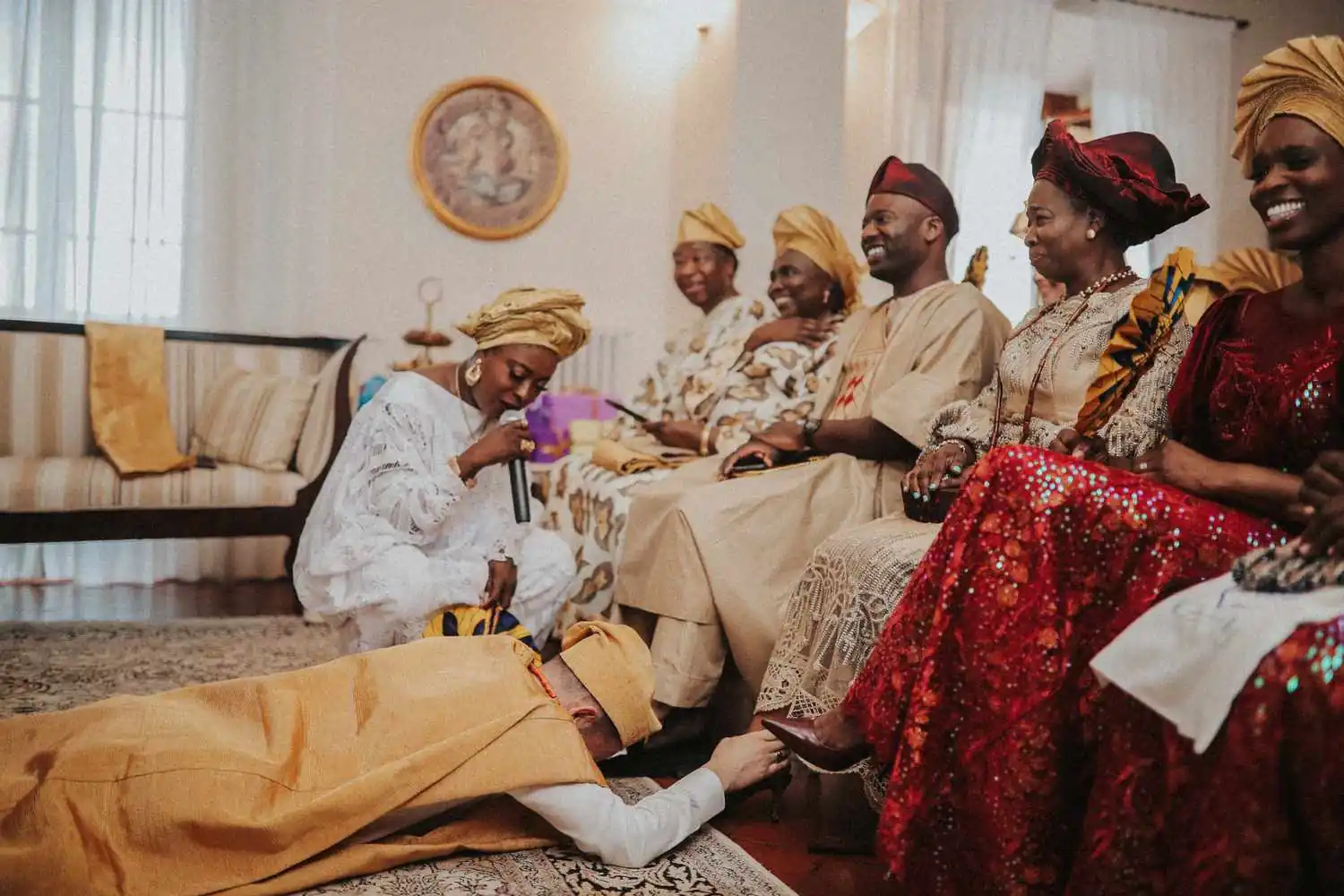
Elders and family members play a central role in Nigerian wedding customs. Their blessings and approval are crucial for the marriage to be recognized by the community.
- Elders as Mediators: They help negotiate the bride price and resolve any disputes.
- Blessings: Elders pray for the couple’s prosperity, fertility, and happiness.
- Family Representation: Both families are actively involved in planning and executing the wedding.
The Impact of Religion on Nigerian Wedding Customs
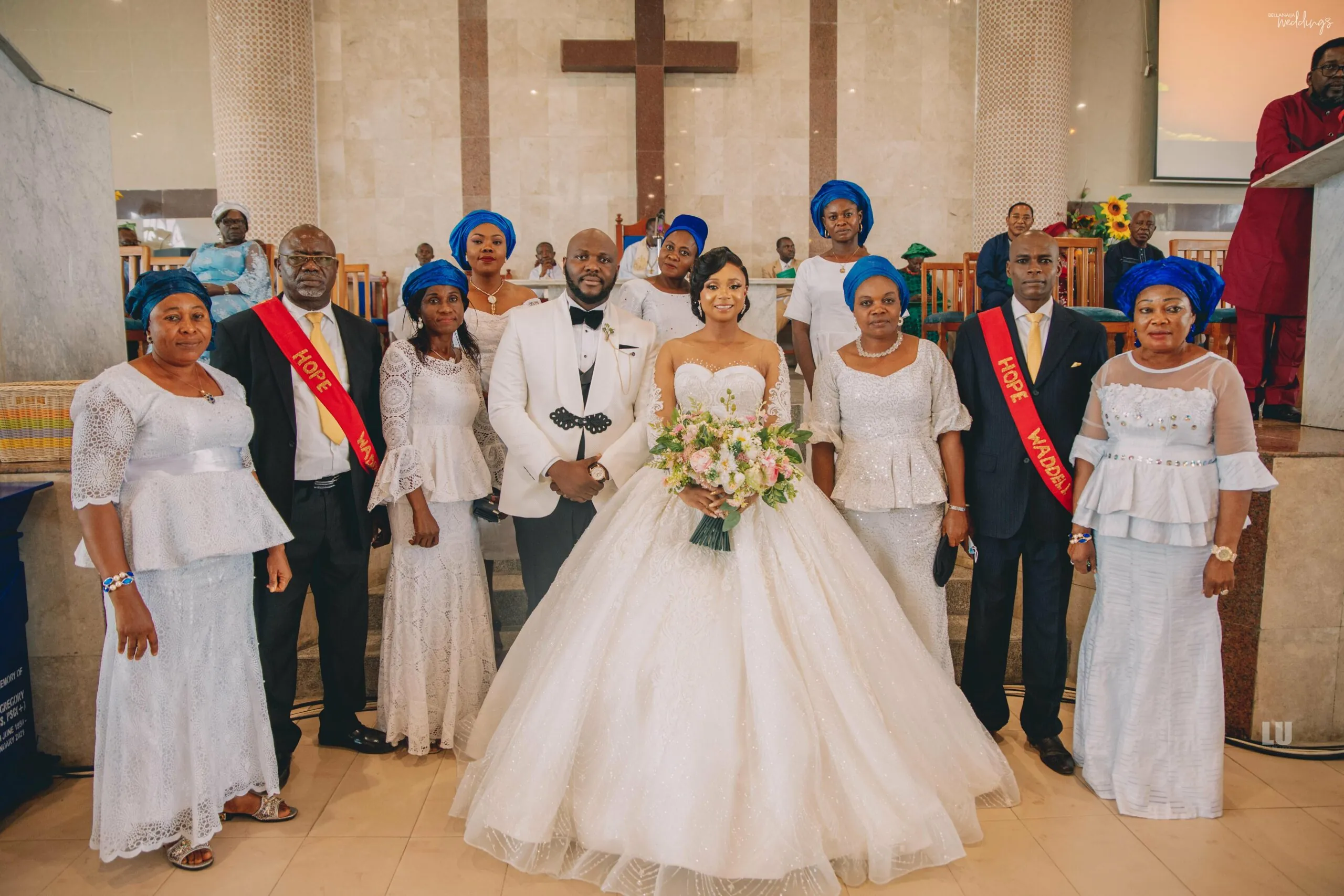
Religion shapes many Nigerian wedding customs, influencing how ceremonies are conducted and what rituals are included.
- Christian Influence: Many couples have both a traditional and a church wedding, blending customs.
- Islamic Influence: Hausa weddings often include prayers and Quranic recitations.
- Traditional Beliefs: Some communities incorporate ancestral blessings and libations.
Gifts and Their Symbolism in Nigerian Wedding Customs
Gift-giving is a significant part of Nigerian wedding customs, symbolizing goodwill, respect, and unity.
| Gift Type | Symbolism | Common Items |
|---|---|---|
| Kola Nut | Unity, hospitality | Kola nuts |
| Money | Appreciation, prosperity | Cash, coins |
| Clothing | Respect, family unity | Wrappers, lace, fabrics |
| Food and Drinks | Abundance, hospitality | Rice, yams, palm wine |
| Household Items | Support for new life together | Pots, pans, bedding |
The Evolution of Nigerian Wedding Customs in the Diaspora
Nigerians living abroad continue to practice traditional wedding customs, often adapting them to their new environments.
- Hybrid Ceremonies: Combining Nigerian and local customs.
- Virtual Participation: Family members join via video calls.
- Cultural Pride: Diaspora weddings showcase Nigerian music, food, and attire, preserving heritage.
Wedding Planning and Preparation in Nigerian Wedding Customs
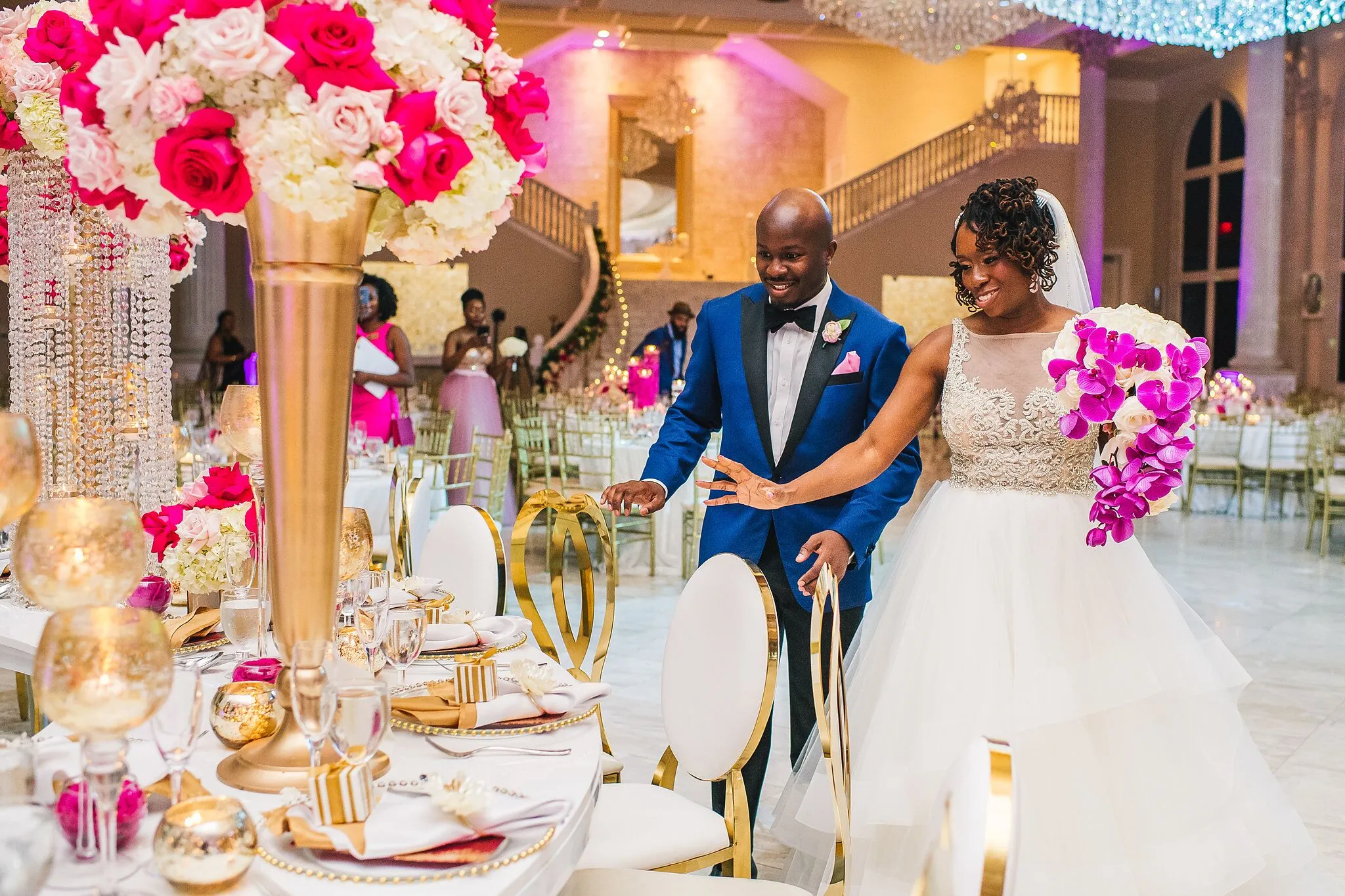
Planning a traditional Nigerian wedding is a community effort and can take several months. Families of the bride and groom collaborate to organize the event, ensuring that customs are respected and that the celebration reflects their cultural values.
- Budgeting: Families discuss financial responsibilities, including bride price, gifts, and event costs.
- Venue Selection: Often held at the bride’s family home, community hall, or event center.
- Guest List Management: Invitations are extended to extended family, friends, and community members.
- Vendor Coordination: Caterers, decorators, musicians, and photographers are hired, often recommended by relatives.
- Rehearsals: Some families hold pre-wedding rehearsals to prepare participants for rituals and dances.
The Role of Women in Nigerian Wedding Customs
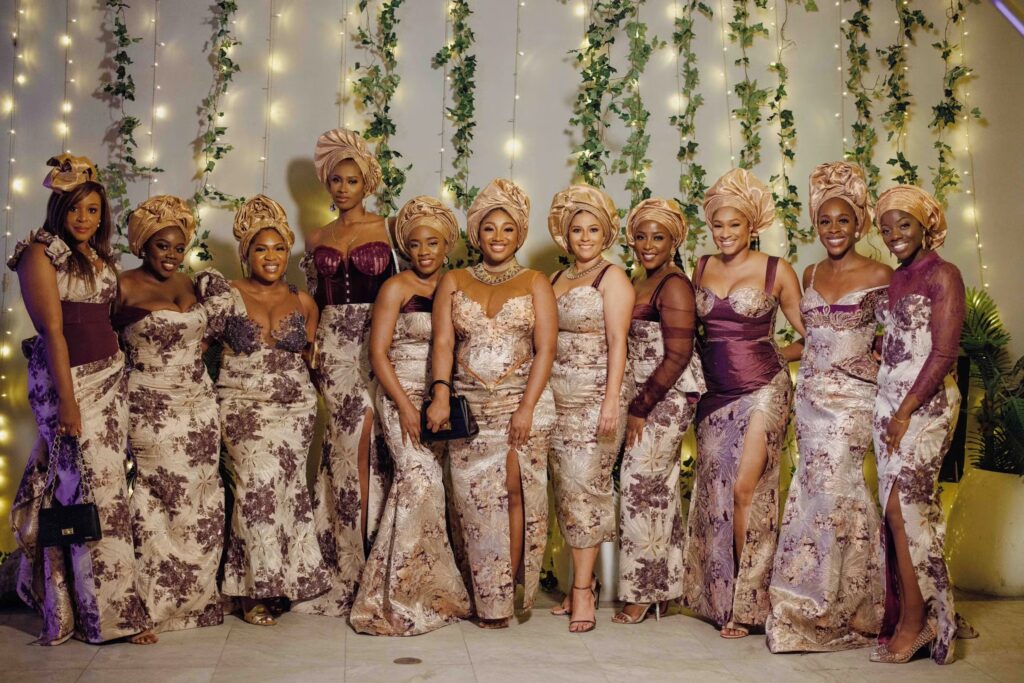
Women play a central and dynamic role in Nigerian weddings, from the bride’s preparation to the participation of female relatives and friends.
- Bridesmaids and Female Relatives: They assist the bride with attire, support during ceremonies, and often wear matching Aso-Ebi.
- Mother of the Bride: Oversees many traditional rituals and ensures customs are properly observed.
- Gele Tying: The art of tying the gele (head wrap) is a skill passed among women, symbolizing elegance and cultural pride.
- Women’s Dance Groups: Female guests often perform traditional dances that celebrate womanhood and fertility.
Symbolism of Colors in Nigerian Wedding Customs
Colors used in Nigerian weddings are rich with meaning and vary by ethnic group and personal preference.
| Color | Symbolism | Common Usage |
|---|---|---|
| Red | Love, passion, vitality | Bride’s attire, beads, caps |
| White | Purity, peace, new beginnings | Wedding gowns, decorations |
| Gold/Yellow | Wealth, royalty, prosperity | Fabrics, jewelry, accessories |
| Blue | Loyalty, trust | Fabrics, male attire |
| Green | Fertility, growth | Decorations, attire accents |
The choice of colors often reflects the couple’s family heritage and the message they want to convey to guests.
Traditional Wedding Vows and Promises in Nigerian Wedding Customs
Unlike Western weddings, traditional Nigerian weddings may not always include formal vows but have spoken promises and blessings that carry deep meaning.
- Family Blessings: Elders bless the couple with prayers for fertility, prosperity, and harmony.
- Bride Price Declaration: The groom promises to care for the bride and her family.
- Mutual Respect: The couple pledges respect and loyalty, often through symbolic acts like sharing wine or kola nut.
- Community Witness: The presence of family and community members serves as witnesses to the couple’s commitment.
Economic Impact of Nigerian Wedding Customs
Nigerian weddings are not only cultural events but also significant economic drivers.
- Boost to Local Businesses: Tailors, caterers, event planners, photographers, and musicians benefit greatly.
- Textile Industry: Demand for Aso-Ebi fabrics and traditional attire supports textile merchants and designers.
- Hospitality Sector: Hotels and event centers see increased bookings during wedding seasons.
- Employment: Temporary jobs arise for vendors, decorators, and security personnel.
- Cultural Tourism: Some weddings attract visitors interested in experiencing Nigerian culture.
The Role of Social Media in Nigerian Wedding Customs
Social media has transformed how Nigerian weddings are planned and celebrated.
- Sharing Moments: Couples and guests post photos and videos, spreading awareness of traditions worldwide.
- Inspiration: Platforms like Instagram and Pinterest provide ideas for attire, décor, and themes.
- Vendor Marketing: Wedding service providers showcase their work to attract clients.
- Virtual Attendance: Especially important for diaspora families who join ceremonies via live streams.
Preserving Nigerian Wedding Customs for Future Generations
Efforts are ongoing to ensure that Nigerian wedding customs remain vibrant and meaningful.
- Cultural Education: Schools and community groups teach young people about traditional practices.
- Documentation: Books, documentaries, and online articles record customs and their meanings.
- Community Festivals: Events celebrate marriage traditions and encourage participation.
- Adaptation: While customs evolve, core values of respect, unity, and family are preserved.
Frequently Asked Questions
Q: Why are Nigerian weddings so large?
A: Weddings are seen as community events, with extended family and friends all invited to celebrate.
Q: What is the meaning of prostration at Yoruba weddings?
A: It’s a sign of respect by the groom and his friends to the bride’s family, asking for her hand in marriage.
Q: Why is the kola nut important in Igbo weddings?
A: Breaking and sharing the kola nut symbolizes unity, hospitality, and respect between families.
Q: How has Nollywood influenced Nigerian wedding customs?
A: Nollywood movies have inspired more elaborate, glamorous weddings and increased the focus on entertainment and fashion.
Q: Do Nigerian wedding customs change outside Nigeria?
A: Yes, they are often adapted to fit local customs and circumstances, but the core traditions remain.
Conclusion
Nigerian wedding customs are a powerful celebration of love, family, and culture. They blend ancient traditions with modern influences, creating events that are joyful, meaningful, and unforgettable. Despite challenges, these customs continue to bring families together and preserve Nigeria’s rich cultural heritage for future generations.